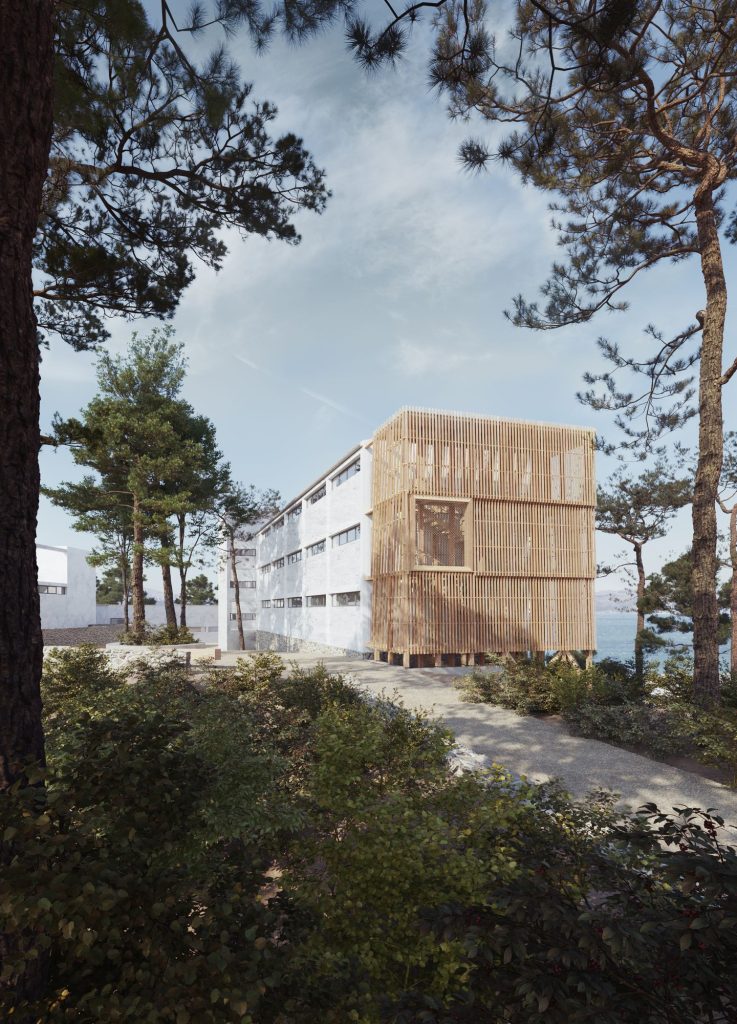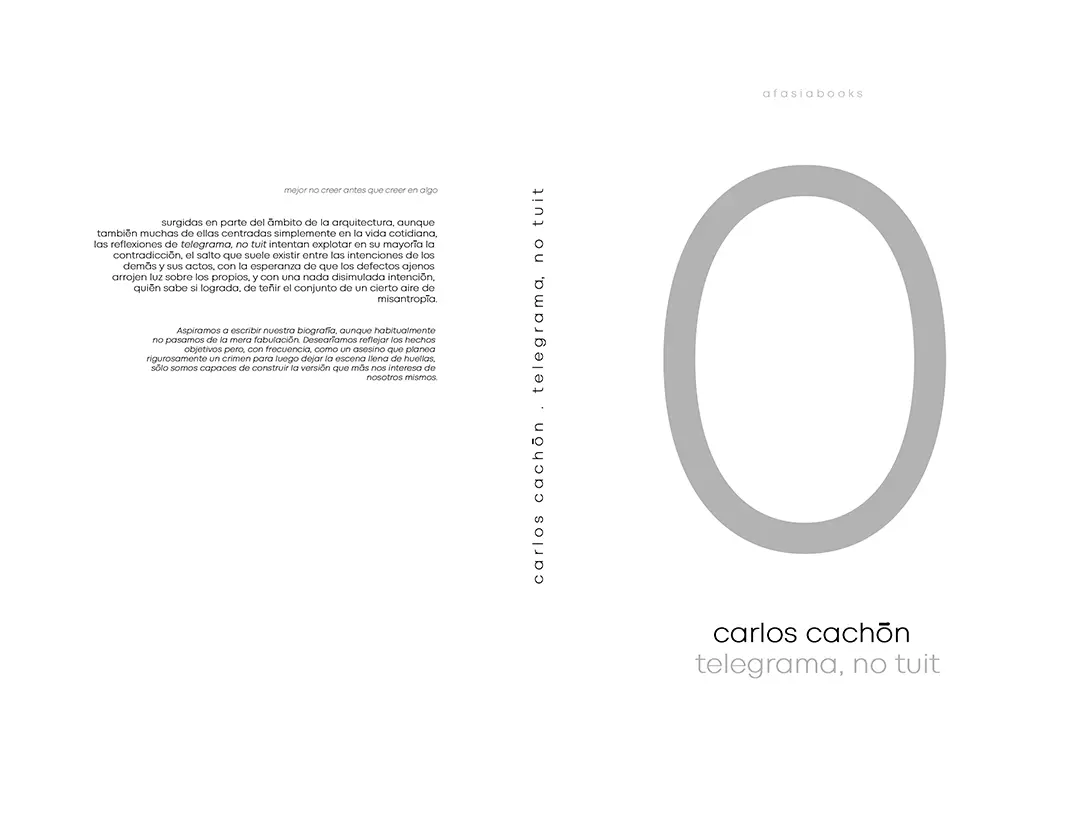
Toni Gelabert Arquitectura . Estudio Gonzalo del Val . renders: © Anfibio
“La Victoria” hostel is placed in a location of great natural and landscape value on the Alcudia peninsula, north of Mallorca. The building was designed by the architect Josep Alcover and inaugurated in 1964 by Pilar Primo de Rivera as one of the summer hostels granted by the Francoist dictatorship to the Women’s Section. These camps aimed to educate religious, nationalist girls who were relegated to the care of men and household chores through various activities. This first stage of the hostel ended in 1977 with the dissolution of this branch of the Falange. As property of the Alcudia City Council, it was managed by the Balearic Youth Institute of the Balearic Islands and continued to serveas a youth hostel until its closure in 2019.
After years of uninterrupted activity during long summers and being part of the childhood memories of Mallorcans, the hostel accumulated repairs and small renovations for its proper functioning, thanks to the center’s management. But after fifty-five years of intensive use, the center not only shows obvious defects but also does not comply with current regulations affecting fire safety, accessibility, and even norms that make the building more energy-efficient.
The goal of our proposal is to amplify the actions aimed at complying with regulations to promote three ambitious criteria: renovatingthe recreational/educational space, establishing a linkwith the context, and redefiningits identity for this historic enclave.
The current building combines a modern architectural project with a vernacular construction work. The late influence of modernity is evident in its functionalist aesthetics: horizontal windows, rational facades, or hygienic and homogeneous coating. However, this architectural approach confronts a disguised local construction, which is necessary for its construction. The hostel is built with load-bearing walls of “marés” stone, the gable roof is made of ceramic tiles, the shutters, essentialto protect from the sun, are the traditional wooden Mallorcan shutters, and the floors are finished with marbled hydraulic tiles. Therefore, our actions on the existing building are focused on preserving and adapting these past architectural conditions. However, new expansion and transformation actions, such as the new emergency staircase or the treatment of the courtyard, respond to new sensitivities: sustainable construction, extended attention onthe context and its users, and the design of a renewed identity.
The main objective of the project is to meet current regulatory requirements to allow the reopening of the hostel, including the removal of architectural barriers and the adaptation of circulation. The courtyard has undergone severalrestorationworks, resulting in an uncomfortable transit, and the space for young people’s interaction has been disrupted. We propose to activate this space, connecting the different access levels with a gentle slope that allows the total use of the space. A meandering ramp traverses the courtyard accompanied by a bench-railing and other elements for non-directed activities.
“La Victoria”hostel is located in an environmentally privileged area of high ecological value, hencethe interventions carried out are sensitive to this delicate location. On the other hand, one of the main requirements demanded by fire safety regulations is the addition of a second emergency staircase. Combining these two criteria, regulatory and ecological, we propose an evacuation point that stands as a natural totem, an environmentally friendly construction with a zero carbon footprint due to its light wooden construction, contrasting with the materiality of the pre-existing building, attending at the landscape, seeing and beeing seen. The construction of this totem gives us the opportunity to redefine a new identity to the hostel, a mirror of a society teaching the youth values such as equality, respect, care, not only between them but also toward a natural, valuable and fragile environment.
_
PARTIAL RENOVATION OF LA VICTORIA HOSTEL. ALCUDIA
Toni Gelabert Arquitectura+ Estudio Gonzalo del Val
Architects: Toni Gelabert, Gonzalo del Val
Collaborators: Ignacio Bengoechea, Ignacio Mártinez, Carmen Ramos
Engineering: Cubic Consultors
Structural engineering: Silvio Escolano
Technical Architect: Joan Company
Manufacturers: BauenConstructora
Promoter: Balearic Youth Institute (IBJOVE)
Visualization: Anfibio
El albergue “La Victoria” está situado en un emplazamiento de gran valor natural y paisajístico en la península de Alcudia, al norte de Mallorca. El edificio fue proyectado por el arquitecto Josep Alcover e inaugurado en el año 1964 por Pilar Primo de Rivera, como uno de los albergues de verano cedidos por la dictadura Franquista a la Sección Femenina. Estos campamentos tenían como finalidad, a través de diversas actividades, formar a niñas religiosas, nacionalistas y relegadasal cuidado del hombre y las labores del hogar. Esta primera etapa del albergue culminó en el año 1977 con la disolución de esta rama de la Falange. Como propiedad del Ayuntamiento de Alcudia, fue gestionado por el Institut Balear de la Joventut de les Illes Balearscontinuó funcionandocomo albergue juvenil hasta su cierre en 2019. Tras años de actividad ininterrumpida durante largos veranos y formando parte del imaginario infantil de los mallorquines, el albergue fue acumulando arreglos y pequeñas reformas para su correcto funcionamiento gracias a los responsables del centro. Pero tras cincuenta y cinco años de uso intenso, el centro no solo presenta desperfectos evidentes, sino que no cumple con las actuales normativas vigentes, que afectan a la seguridad frente a incendios, la accesibilidade inclusoa las normas que hacen más eficiente el uso de la energía en el edificio. El objetivo de nuestra propuesta es amplificar las actuacionesdirigidas a cumplir la normativa para promover tres ambiciosos criterios: renovar el espacio lúdico/pedagógico, establecer unvínculocon el contexto y construir renovar su identidad para este histórico enclave. El actual edificio combina un proyecto de arquitectura moderna con una obra de construcción vernácula. La influencia tardía de la modernidad se aprecia en su estética funcionalista: ventanales horizontales, fachadas racionales o acabados higienistas y homogéneos. Pero esta manera de hacer arquitectura confronta con un disimulado localismo constructivo, que se hace necesario para poder llevar a cabo su construcción. El albergue se edifica con muros de carga de piedra de marés, la cubierta a dos aguas esta realizada en teja cerámica, las contraventanas necesarias para proteger del sol son las tradicionales mallorquinas de madera y los suelos están acabados con una baldosa hidráulica marmolada. Es por ello por lo quenuestras actuaciones sobre el edificio existente se centran en preservar y adecuar estas condiciones arquitectónicas pasadas. Sin embargo, las nuevas actuaciones de ampliación y transformación, como es la nueva escalera de emergencia o el tratamiento del patio, responden a nuevas sensibilidades: una construcción sostenible, la atención ampliada al contexto y sus usuarios, y el diseño de una renovada identidad. El objetivo principal del proyecto es cumplir los requerimientos normativos actuales para permitir la reapertura del albergue, entre ellos la supresión de barreras arquitectónicas y la adaptación de circulaciones. El patio ha ido sufriendo muchas obras de conservación, llegando a un punto en el que su tránsito se hace incómodo y el espacio de relación de los jóvenes ha cuidando el paisaje quedado descompuesto. Proponemosactivar este lugar, uniendo las diferentes cotas de acceso por una suave pendiente que permite el uso total del espacio. Una serpenteante rampa recorre el patio acompañada de un banco-barandilla y otra serie de elementos para actividades no dirigidas. El albergue la Victoria se encuentra en un entorno privilegiado de un alto valor ecológico, es por ello que las intervenciones llevadas a cabo son sensibles con este delicado emplazamiento. Por otro lado, uno de los principales requerimientos que exigen las normas de seguridad contra incendios es la adhesión de una segunda escalera de emergencia. Ensamblando estos dos criterios, normativos y ecológicos, proponemos un punto de evacuación que se erige como un tótem natural, una construcción respetuosa con el medio ambiente, con una huella de carbono cero gracias a su construcción ligera de madera, contraponiéndose con la materialidad del edificio preexistente, atendiendo al paisaje, mirando y dejándose ver. La construcción de este tótem, nos da la oportunidad de definir una nueva identidad para el albergue La Victoria, reflejo de una actualidad en la que se enseña a los más jóvenes valores como la igualdad, el respeto y el cuidado, no solo entre ellos sino también el cuidado hacia un contexto natural, valioso y delicado.

















